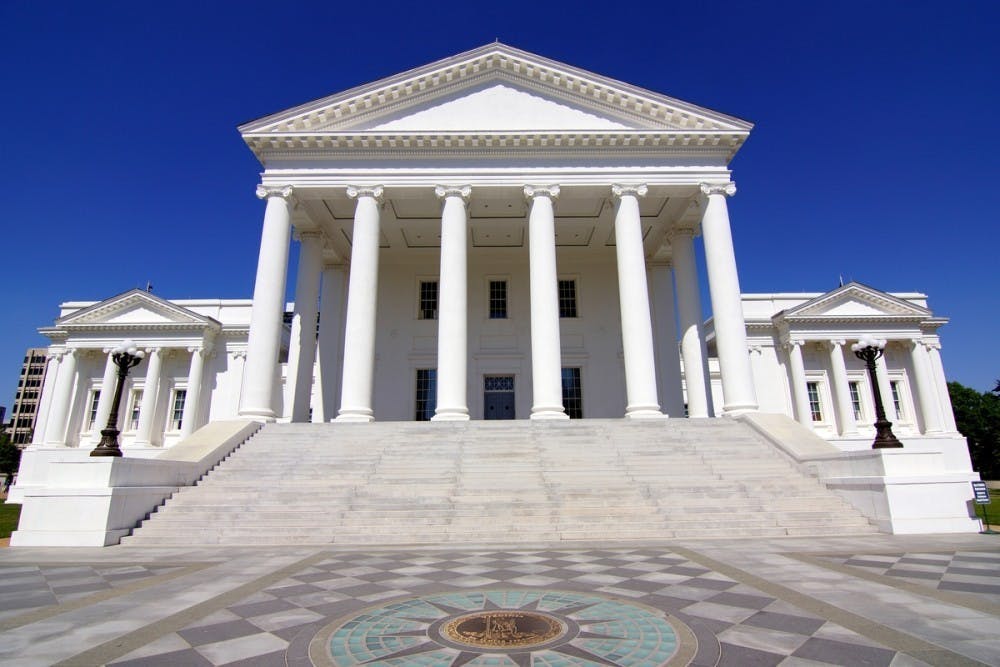Following the end of 20 years of Republican control in the General Assembly, the newly empowered Democratic leadership aims to address a wide range of high-profile legislative priorities, including raising the minimum wage, advancing gun control measures, reforming the criminal justice system and requiring in-state tuition for DREAMers.
Governor Ralph Northam, D-Va., and legislative leaders released their “Virginia 2020 Plan” Jan. 7 that highlights eleven points to be addressed within the 60-day legislative session. The budget presented by Northam in December 2019 proposed a $135 billion operating budget for 2020-2022.
Other policy goals outlined in the Virginia 2020 Plan include passing the Equal Rights Amendment, restoring women’s reproductive rights, and expanding affordable housing, in part by investing in the Virginia Housing Trust Fund. Legislators also plan to address banning discrimination in housing and employment — specifically against LGBTQ people — making voting easier, fighting climate change, increasing education funding and expanding transit and broadband.
November saw Democrats flip and gain control of both chambers of the General Assembly, enabling them to determine the state’s legislative agenda for at least the next two years. The election came five months after a period of intense litigation and lawsuits surrounding racial gerrymandering that ultimately ended with the redrawing of boundaries on the Virginia district map.
Efforts to encourage and enable voter registration were bipartisan, with many student organizations hosting events around Grounds in the weeks leading up to the election. University precincts saw a 469 percent increase in turnout in comparison to 2015, the most recent off-year election for the House of Delegates and State Senate.
According to Jackson Postal, first-year College student and communications chair of the University Democrats, UDems registered 1,023 people during the fall semester.
“While [UDems] have not taken specific action to mobilize or lobby in support of any of the specific pillars in the Virginia 2020 plan, the plan represents a progressive ideal for an improved Virginia that UDems is strongly in favor of,” Postal said.
Student activists on Grounds have a long history of mobilization related to the legislative priorities enumerated in Northam’s plan.
The University’s employee minimum wage, including that of contracted workers, officially increased to $15 Jan. 1, following advocacy from community members, employees and students — many of whom are involved with the Living Wage Campaign, an organization active at the University since 1998.
In the coming weeks, U.Va. student activists involved with the Virginia Student Power Network and DREAMers on Grounds will travel to Richmond in coalition with other students from across the state to lobby for and demand action on various issues, including in-state tuition and driver’s licenses for undocumented community members and criminal justice reform.
The Virginia 2020 Plan only explicitly lists “in-state tuition for DREAMers,” excluding undocumented students without DACA status.
Currently, DACA students at the University may qualify for in-state tuition, and the University also recently expanded financial aid to include in-state students with DACA status in the fall of 2019. However, undocumented students without DACA status and out-of-state DACA students remain inelegible for financial aid.
“We want to see U.Va. and President Jim Ryan on the frontlines in support for the in-state tuition bills by signing a letter we are drafting for [presidents of educational institutions in Virginia] and student organizations to sign,” DREAMers on Grounds said.
According to DREAMers on Grounds, most institutions, including the University, do not matriculate undocumented students. Thus, their main goals include mobilizing for not only the requirement of in-state tuition for all undocumented students, regardless of status, but also the matriculation of undocumented students without DACA status.
Last Wednesday, the first day of the legislative session, more than 200 supporters from across the state rallied in support of SB 183, a bill co-sponsored by University professor and newly elected Del. Sally Hudson, D-Charlottesville, that would enable a locality to “remove, relocate, or alter any monument or memorial for war veterans located in its public space, regardless of when erected.”
Currently, a Virginia statute prevents cities and towns from removing war memorials. Hudson’s proposed bill would enable the Charlottesville City Council to remove the statue of Confederate general Robert E. Lee, around which violence erupted during the white supremacist rallies of August 2017.
Although not included among the legislative priorities of the Virginia 2020 Plan, Northam announced his support on Thursday for the bill.
“We are presenting an agenda that is different from every previous General Assembly session,” Northam said. “It’s more forward looking than ever before, and it reflects what Virginians sent us here to do.”







